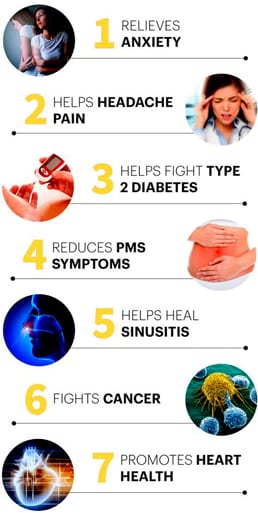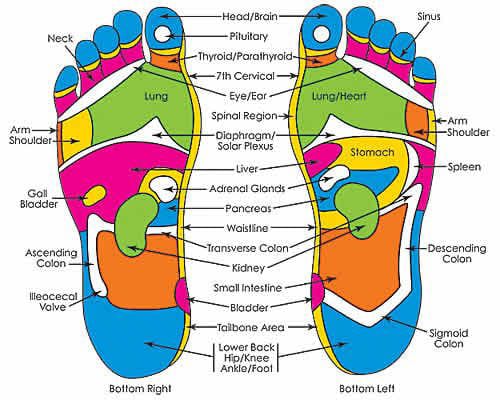What is Reflexology?
Blue indicates link

Also referred to as zone therapy, is a holistic massage therapy that applies pressure to certain areas and points on your ears, hands, and feet, without the use of lotion or oil.
Reflexology practitioners believe that these reflex points and areas correspond to several different systems and organs in the body. Thus, with the appropriate amount of pressure, reflexology can provide a beneficial effect on the person’s organs and overall well-being.
Reflexology is a type of therapy that uses gentle pressure on specific points along your feet (and possibly on your hands or ears as well) to help you feel better. The theory is that this eases stress, and that helps your body work better. It’s also known as zone therapy.
The way reflexology connects spots on the outside of your body to the inside is a bit like acupuncture and acupressure. But those therapies use points all over your body, not just on your feet, hands, and ears. And while reflexologists do use their hands, it isn’t a form of massage.
It is considered a form of alternative medicine. In ancient times, this medical system was widely used and practiced in several countries, including India, Egypt, and China. Today, millions of people all over the world are taking advantage of this ancient practice to boost their body’s healing process.
As a matter of fact, it is one of the world’s fastest-growing health trends and medical practices. In Denmark, for instance, over 20% of the country’s total population had
used reflexology to improve their overall well-being.
Like those other therapies, though, reflexology is complementary to medical treatments. It can be done alongside traditional care, but it’s not an alternative to it, and reflexologists don’t diagnose or treat illnesses.
How It Works
Your body becomes imbalanced when it is under a great deal of stress or suffers from any injury or disease. Reflexology helps restore the body’s balance and reinstates its equilibrium.
This treatment is, obviously, carried out by a licensed reflexologist, a certified and trained professional who has the know-how of the pressure zones and areas of the feet and hands.
➢ In this medical practice, the patient is required to lie down on a reflexology treatment bed.
➢ Afterward, the reflexologist applies an appropriate amount of force on particular points on the patient’s feet using only his or her hands, stimulating the nerves’ sensory receptions in the patient’s foot.
➢ Then, the nerve impulse is transmitted to the patient’s spinal cord, allowing the body to distribute it to the whole nervous system.
➢ This, in turn, causes a release of pain-relieving into the bloodstream, giving a soothing sensation and effect to pains, and aches in the body.
Reflexology practitioners use foot charts as a guide, as they apply the appropriate pressure to certain reflex areas and zones. In some cases, they use items to help them in their work, such as sticks of wood, rubber bands, and rubber balls.
The Theory Behind Reflexology
The body has the ability to heal itself. Following illness, stress, injury, or disease, it is in a state of “imbalance” and vital body systems can be blocked, preventing the body from functioning optimally. Reflexology can be used to restore and maintain the body’s natural balance and facilitate healing. For each person, the application and the effect of the therapy are unique. Sensitive, trained hands can detect tiny deposits and imbalances and by working on these points, the Reflexology Therapist can release these blockages.
Reflexology is one of the safest and least invasive complementary therapeutic practices available.
Reflexology Benefits
Reflexology may help you feel less stressed, more relaxed, and more energized. But the benefits might go deeper if you have certain health issues.
Some people with medical conditions find that they feel less pain and discomfort if they have less stress, and reflexology may help with that. Researchers reviewed 17 studies of the psychological benefits of the therapy and found that it boosted feelings of well-being and made it easier for people to manage their conditions.
More research is needed to see if reflexology can have a direct effect on specific conditions, but based on what we know so far, it may ease:
- Anxiety among people who’ve had heart surgery
- Pain during labor
- Arthritis pain
- Some symptoms of multiple sclerosis, like fatigue and uncomfortable skin sensations
- Emotional and physical pain caused by cancer
It may also help:
- Improve sinus issues
- Relieve back pain
- Ease constipation
Medical experts and reflexologists say that it can also be used to address a broad range of symptoms and medical conditions, including:
➢ Diabetes
➢ Headaches
➢ PMS
➢ Cardiovascular issues
➢ Asthma
➢ Enhance sleep
➢ Help with depression and anxiety
➢ Thyroid imbalance
➢ Sinusitis
➢ Respiratory problems
➢ Neck problems
➢ Muscle tension
➢ Multiple sclerosis
➢ Eczema
➢ Constipation
➢ Bowel disorders
➢ Hypertension
➢ Back problems
➢ Arthritis
➢ Allergies
➢ Hormonal problems
How Does Reflexology Work?
There are different theories about the exact way that reflexology works, but the main concept of all is that different areas of the feet are linked to specific body parts and that putting pressure on one area of the foot can have an effect on the organ that it corresponds with.
According to zone theory, a foot is divided into five zones that run from toe to heel: The big toe is zone 1, and the pinky toe is zone 5. The body is divided into 10 zones that run from head to foot. Zone 1 aligns with the left and right center of the body, and zone 5 aligns with the left and right sides of the body. When you place pressure on zone 1 in the foot, it can relieve pain in the part of the body that’s linked to that area.

A theory that dates back to the 19th century suggests that reflexology works by stimulating the nervous system. Pressing on areas of the feet in a calming way stimulates the nerves there, which sends a message to the central nervous system. This helps to relax the body and has positive effects on your breathing, blood flow, immune response, and more.
Another theory suggests that reflexology helps offset the way that your brain registers pain. When your feet are massaged, the relaxing sensations may help relieve stress and improve your mood, which may make you less inclined to perceive pain as deeply.
Still, another theory suggests that your body contains “vital energy” that is affected by stress. If you don’t work to relieve the stress, your body may not work as well as it should, which may lead to aches or illness. Reflexology is thought to help you maintain the flow of vital energy through your body.
When You Should Avoid Reflexology
Most people, even those in the hospital, can benefit from reflexology. A study on women with advanced breast cancer found it was safe even for people who are very ill.
But you shouldn’t have reflexology if you’re recovering from an injured foot or have gout. Because it may affect blood flow, it’s not for people with blood clots or women who are pregnant.
If you have a chronic condition, a disease that affects your feet or legs, or arthritis in your feet or ankles, ask your doctor first. If your feet are off-limits, you may still be able to have reflexology on your hands or ears.
Lower extremity swelling or chronic skin changes that are a result of vascular problems in the feet should also limit this form of therapy. The recent removal of a cancerous tumor or other surgical procedures, such as wart removal, also makes reflexology inadvisable.
Remember to always consult with your doctor before trying any type of alternative health remedy.
What Health Concerns Is Reflexology Used For?
In broad terms, reflexology is intended to reduce generalized stress and help the body achieve a state of deep relaxation and homeostasis (that is, the optimal balance of the body’s biochemical and other systems). Yet efficacy studies are few, and a 2009 systematic review of randomized controlled trials conducted by researchers at the Peninsula Medical School in Exeter, UK, concluded that “the best evidence available to date does not demonstrate convincingly that reflexology is an effective treatment for any medical condition.”
For Images Of Reflexology Please Visit
https://www.pinterest.ca/sherardm/reflexology/
Thank you for reading
Michael
Comments are welcome
Hello, this is a very awesome piece and a very detailed one. I’m really happy I came across this as the information I’m getting from here is standard. I never know what reflexology is all about but now I know and I am enlightened thank you so much for this knowledge I am so happy.
Hi Brenda,
Thank you for your comments. Glad you found reflexology enlightening.
Best wishes,
Michael